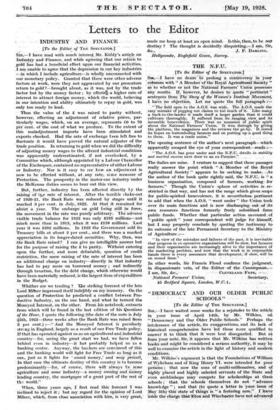Letters to the Editor
INDUSTRY AND FINANCE [To the 'Editor. of THE SPECTATOR.] Sit,—I have read with much interest Mr. Kiddy's, article on Indust,ny and -Finance, and while agreeing that our return to gold has had a beneficial effect upon our financial activities, am unable to agree that the depression innuilrey industries nwhich I include agriculture—is wholly. unconnected with our monetary policy. Granted that there were other adverse factors at work, were they not aggravated by our premature return to gold ?—hrought about, as it was, not by the trade factor but by the money factor ; by offering a higher rate of interest to attract foreign money, which the world, believing in our-intention and ability ultimately to repay in gold, was
only too ready to lend. . - -
• Thus the value of the £ was raised to parity without, however, effecting an adjustment of relative prices, par- ticularly wages, which, on an average,- represents CO to 70 Or' cent. of the cost .pf what we produce. To the extent of this maladjustment imports have been stimulated and exports checked. Had the rate of exchange teen left free to fluctuate it would, have proved the natural adjuster of the trade position. In returning to gold when we did the difficulty Of adjusting money wages to the altered industrial conditiOns was apparently underestimated, if not overlooked, by a Conimittee which, although appointed by a Labour Chancellor of the Exchequer, contained no representative of either Labour or Industry. Nor is it easy to see how an adjustment is now to be effected without, at any rate; some measure of Protection. The prosperity in the Motor-car industry under the McKenna duties seems to bear out this view.
Brit, further, industry has been affected 'directly ty the _ .
raising of the rate of interest. After the terrible shake-out of 1920-21; the Bank Rate was reduced by stages until it reached- 3 per cent. in July, 1922. At that, it remained for • abOat a year The embargo- on gold being still in force, the movement in the rate was purely-arbitrary. The adverse visible trade balance for 1928 was only £195 millions—not Much more than* in 1913, when it was £158 millions. :Last year it was £392 millions. In 1923 the GOvernment sold its Treasury bills at about 2 per cent., and there was a marked appreciation in its longer-dated securities. Why, then, was tiie Bank Rate raised? I can give no intelligible answer, but for the purpose of raising the £ to parity. WithOut entering upon the further, and more debatable, question of credit restriction, the mere raising of the rate of interest has been an additional charge on industry-I-directly in that industry has had to pay more on borrowed money ; and indirectly through taxation, for the debt charge, which otherwise would have been materially reduced, is the largest item of expenditure in the Budget.
Whither are we tending ? The striking forecast of the late Lord Miller impressed itself indelibly on my memciry. On the question of Protection he predicted a conflict between Pro- ductive Industry, on the one hand, and what he termed the *Moneyed Interest, on the other. From his ncitebook, extracts from which will be found in the last edition of his Questions of the Hour, I quote the following (the date of the note is July 45th, 1923-7three weeks after the Bank Rate was. raised from 3 per cent.) :—" And the Moneyed fnterest is peculiarly • strung in England, largely as a result of our Free Trade policy. If thsit has operated against us as an agricultural and industrial country—for, seeing the great start we had, we have fallen behind even in industry—it has probably helped us R s a banking centre. Anyway, the bankers are convinced of this and the banking world will fight for Free-Trade as.lorii as it can, just as it fights for ' sound money,'. and may prevail. - In that case the ultimate destiny of this country is to become
predominantlyfor, of course, there will alcvays be some . , agriculture and some industry—a money owning and money - lending country, the mortgagee of a great part of the rest of thit world."
When, three years ago, I first read this forecast I was ineliried to reject it ; but my regard for the opinion of Lord
Milner, which, from close association with hini, is i7ery•great, . _ -made me keep at least an open mind. Is this, then,to be out destiny ? The thought is decidedly, disquieting.:—I am, Sir, &c., J. F. DARLING. Hollyeambe, Englefield Green, Surrey. ,


































 Previous page
Previous page